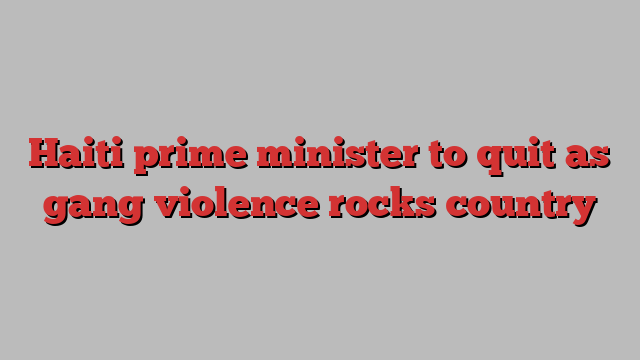
Unlock the Editor’s Digest for free
Roula Khalaf, Editor of the FT, selects her favourite stories in this weekly newsletter.
Haiti’s Prime Minister Ariel Henry will resign once a transitional council has been created to run the Caribbean country, amid rising violence and pressure to step down from street gangs.
“There is no sacrifice too great for our country, for Haiti,” Henry said in a video statement released in the early hours of Tuesday morning. “I will resign following the implementation of a transitional council.”
Henry became prime minister and the de facto leader of the country following the assassination of president Jovenel Moïse in 2021. Though unelected, he had the support of the US for much of his 32 months in office, a tumultuous period during which violent gangs expanded their control over the nation’s capital Port-au-Prince.
Henry’s resignation was first announced by Guyana’s President Irfaan Ali, chair of the Caribbean Community (Caricom) trade bloc, after an emergency meeting on Haiti on Monday.
“We acknowledge his resignation upon the establishment of a transitional presidential council and naming of an interim prime minister,” Ali said in a statement on Monday night, flanked by other Caribbean leaders. “I want to pause and thank Prime Minister Henry for his service to Haiti.”
A transitional council made up of seven voting members and two observers — including representatives from Haitian civil society, the private sector and the church — will “swiftly” select a temporary prime minister, Ali said. He added that those who intend to run for president will not be allowed to sit on the council.
“We recognise that there is much work left to be done to secure a better future for the Haitian people,” a senior US official said on Tuesday, adding that anyone under UN sanctions will also be barred from the transition council. “This is an incredibly important milestone and in broadening Haitian governance and addressing the concerns of the Haitian people going forward.”
The last time Henry was seen in public before Tuesday was on March 1 in Nairobi, for talks on a long-stalled UN-backed mission to bolster Haiti’s outmatched police force in its fight against gangs.
During Henry’s absence gangs ran riot across the capital, helping 3,800 inmates escape from two jails and attacking police stations, the airport and the seaport. One feared gang leader demanded Henry’s dismissal.
“We Haitians have to decide who is going to be the head of the country and what model of government we want,” Jimmy Cherizier, a gang leader better known as “Barbecue”, told reporters on Monday. “We are also going to figure out how to get Haiti out of the misery it’s in now.”
Washington’s patience with Henry finally appeared to run out this month after an alliance of once-rival gangs launched attacks across Port-au-Prince while the prime minister was in the US territory of Puerto Rico.
US secretary of state Antony Blinken on Thursday urged Henry to “expedite a political transition” through the creation of “a broad-based, independent presidential college”.
Henry, a former neurosurgeon, was vastly unpopular in Haiti, where demonstrators often called for his removal during violent protests that became a hallmark of his tenure. He did little to halt the advance of about 200 gangs which, according to the UN, now control about 80 per cent of the capital. Last year, 5,000 people were killed while 200,000 were displaced.
Monique Clesca, a Haitian democracy activist and member of the Montana Group of opposition and civil society members, said his tenure amounted to a “dictatorship”.
“There’s a song doing the rounds in demonstrations around the country, saying that Ariel Henry came and destroyed the country,” Clesca said. “We are getting deep into a dictatorship, we are deep into repression.”
Earlier on Monday, Blinken, Caricom leaders and UN officials held an emergency meeting on Haiti in Jamaica where the US pledged an additional $100mn towards a proposed international mission to support the Haitian police, on top of $200mn previously promised.
Kenya has committed to lead the long-stalled mission, though it is unclear when it might be deployed.

